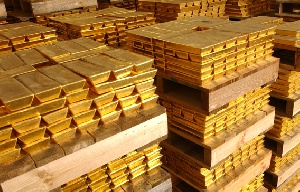Ghana will lose 500,000 ounces of gold this year as a result of some mining companies suspending their operations as a result of declining gold prices, the Minerals Commission has predicted.
Gold production for 2014 is estimated at 3.1 million ounces, from an initial target of 3.6 million, an Assistant Manager at the Minerals Commission, Daniel Krampah has stated.
"We will definitely record lower volumes this year,” he said, adding that, some companies have placed their mines under care and maintenance.
The price of an ounce of gold as at last Friday goes for $1,299.71, according to Bloomberg. Supposing this price remains the same throughout the year, Ghana will be losing $649,855,000 in revenue due to the 500,000 ounces shortfall.
Ghana's gold production climbed to a record 4.3 million ounces in 2012 from 3.6 million ounces the previous year after prices reached a record high in September 2011.
The nation produced 107.9 metric tons of gold in 2013, making it the eighth- biggest producer, according to data from Thomson Reuters.
Gold accounts for about 90 percent of total mineral output in Ghana. The mining sector, especially gold, continues to rake in billions of dollars every year, with the commodity currently leading the country’s export earnings, surpassing cocoa, which had for a long time been the country’s biggest export earner. On the average, the sector has contributed about $2 billion per annum to Ghana’s GDP in the last decade.
However, as most of the gold mining concessions belong to private investors, the mining sector’s contribution to Ghana’s GDP does not mean that the revenues belong to the Government and people of Ghana.
Generally, the government retains just a 10% carrying interest in mining companies to which it grants a license. So legally, that is all Ghana and Ghanaians may own in the mining operations in Ghana, other than for various levies, fees, licenses, taxes and royalties that the government imposes on mining companies.
Ghana's economy slowed sharply in the third quarter of 2013 and rose a meager 0.5 percent over the previous quarter, down from a 3.9 percent expansion in the previous three-month period due to a sharp fall in global gold prices, which prompted some mines to cut production.
Business News of Monday, 5 May 2014
Source: Business Day
Ghana to lose over $600 million over falling gold prices
Entertainment












